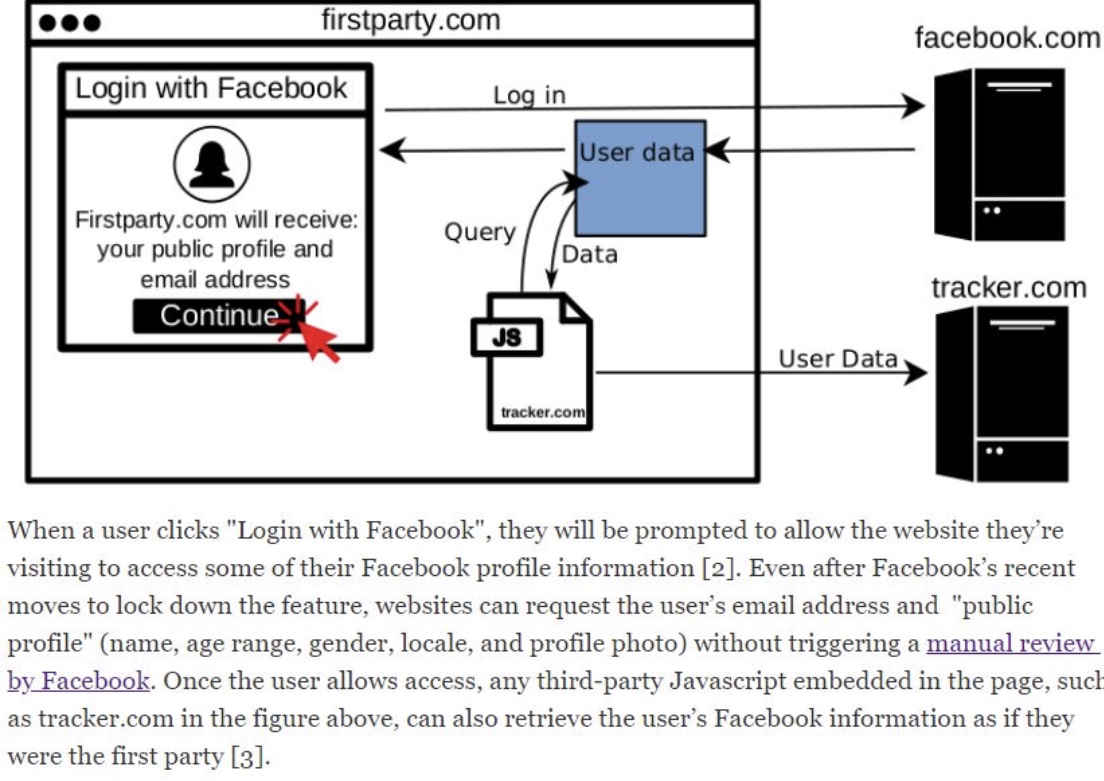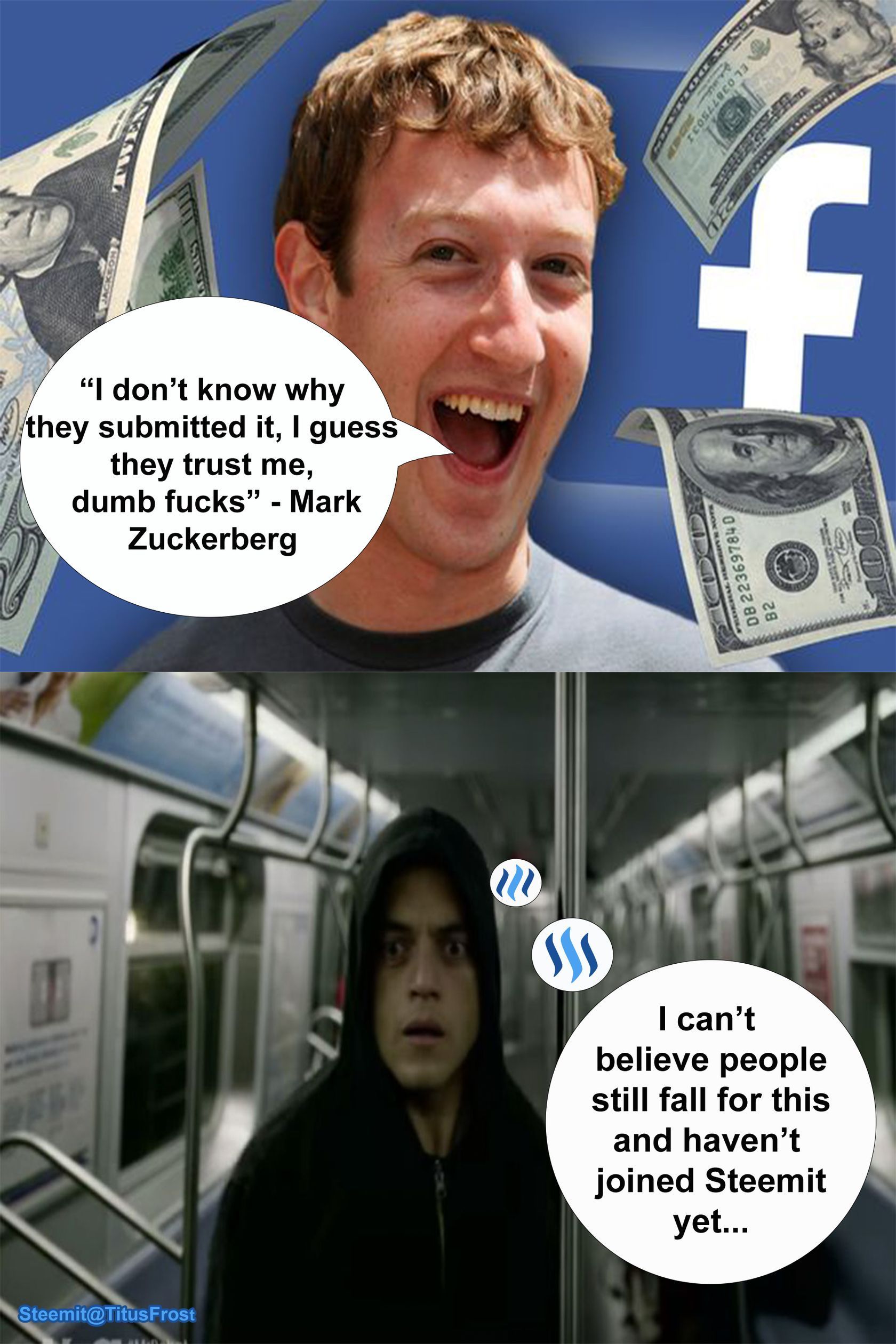Regulation arbitrage... Facebook again. own your data!
It is not by design that I keep writing about this... I would rather do a travel or food blog, believe me. But it's not me, so here I am again sharing something i read earlier about our dear friends at Facebook.
"If a new European law restricting what companies can do with people’s online data went into effect tomorrow, almost 1.9 billion Facebook Inc users around the world would be protected by it. The online social network is making changes that ensure the number will be much smaller."
I shared this in a comment on another post, but I think it fits well here:

Now that you see how the data is collected by applications, it is key to understand that Facebook and and the apps are using it as the main input in their money making machine. Without the supply of a key input in their machine, there would be a worse output.
To this end and with the upcoming EU regulation, Facebook is trying to limit its exposure to the regulation. For the reasons stated above, it makes perfect sense from their standpoint and I do not have anything to say against them for that.
Once again, it is a matter of user being educated about what is going on with their data and understanding what corporations are doing with it. Observe their behavior, not their PR campaigns.
If you are very much interested in this specific topic, I invite you to read the whole article.
https://www.reuters.com/article/us-facebook-privacy-eu-exclusive/exclusive-facebook-to-put-1-5-billion-users-out-of-reach-of-new-eu-privacy-law-idUSKBN1HQ00P
Reporting by David Ingram in San Francisco; Additional reporting by Joseph Menn in San Francisco, Padraic Halpin and Conor Humphries in Dublin and Douglas Busvine in Frankfurt; Editing by Greg Mitchell and Bill Rigby
Steem on,
Lio
Congratulations @liotap! You have completed some achievement on Steemit and have been rewarded with new badge(s) :
Click on any badge to view your own Board of Honor on SteemitBoard.
To support your work, I also upvoted your post!
For more information about SteemitBoard, click here
If you no longer want to receive notifications, reply to this comment with the word
STOP@liotap, this is both informative and disturbing! A discussion we have been having for awhile now.
Great post and follow-up to your prior posts @liotap. Clearly this will continue the user attrition from traditional social media and accrue value to Steemit.
i would like to think so. Every little bit helps. literacy on the matter, that s what it is about at this starting point.
So many just don't get it or just ignore the risks. I'll resteem.
I appreciate all the posts about this topic i am not really following it so you are keeping me in the loop and i'm sure Facebook will get their way with the regulators, money solves all problems though it may be a large amount this time. Upvoted and Resteemed.
thank you for sharing, we @steem-ambassador are very happy with the posts you write and this valuable information deserves a reward from the @steem-ambassador account.
Do not forget to spread love in the #promo-steem tag
The Observer reported on Saturday that Cambridge Analytica acquired 50m Facebook profiles from a researcher in 2014. This appears to have been among the most consequential data breaches in history, with an impact that may rival the breach of financial records from Equifax.
The General Data Protection Regulation (GDPR), which will apply from 25 May 2018, creates consistent data protection rules across Europe. It applies to companies that are based in the EU and global companies that process personal data about individuals in the EU.
While many of the principles build on current EU data protection rules, the GDPR has a wider scope, more prescriptive standards and substantial fines. For example, it requires a higher standard of consent for using some types of data, and broadens individuals' rights with respect to accessing and porting their data. It also establishes significant enforcement powers, allowing a company's supervisory authority to seek fines of up to 4% of global annual revenue for certain violations.
Thanks @asim1234 for your comments. Great point on GDPR, it's a start.
1-None of the data Cambridge got involves ‘hacking’ Facebook, a data breach or exploiting a bug. Instead, it all revolves around the use of a feature that Facebook provided to all developers and (at least) tens of thousands took advantage off.
2-The data collected was not internal Facebook data. It was data that developers accessed from the profiles of people who downloaded their apps (and their friends). Facebook has a lot more data on users than is publicly available and it has it for everyone who uses their platform. No-one but Facebook has access to that data. This is a point that almost all the journalists involved seem unable to grasp, instead they repeatedly equate ‘Facebook’s internal data’ to ‘data accessed from Facebook profiles using a third party app’. But these are VERY different things.
Source and to read a lot more:
https://medium.com/@CKava/why-almost-everything-reported-about-the-cambridge-analytica-facebook-hacking-controversy-is-db7f8af2d042
Thanks for a good reply and huge thanks for the link you provide me Wish you health and wealth
health is wealth! Have a good weekend @asim1234
Facewhat? lol 😆. I’m glad I have never had acc with FB. However, I’m certain there are other ways they are spreading our information just like FB does. Google, Twitter... they all doit. FB crossed the line. They are Goverment’s sponsored and protected company. Recent hearings of Zuckerberg was just a ridiculous comedy.

Thats great i think we are not safe on facebook and the main thing our privacy is not secure and data may leakage so its good for us to leave facebook and secure yourself
you crea a great content i appereciate youf for that
The General Data Protection Regulation (GDPR), which will apply from 25 May 2018, creates consistent data protection rules across Europe. It applies to companies that are based in the EU and global companies that process personal data about individuals in the EU.
While many of the principles build on current EU data protection rules, the GDPR has a wider scope, more prescriptive standards and substantial fines. For example, it requires a higher standard of consent for using some types of data, and broadens individuals' rights with respect to accessing and porting their data. It also establishes significant enforcement powers, allowing a company's supervisory authority to seek fines of up to 4% of global annual revenue for certain violations.
this is really informative post@ liotap